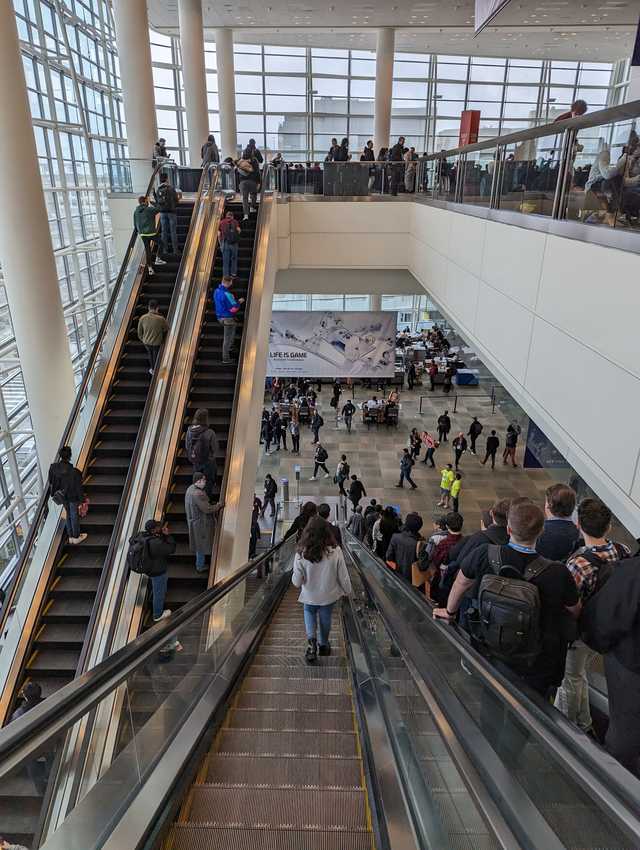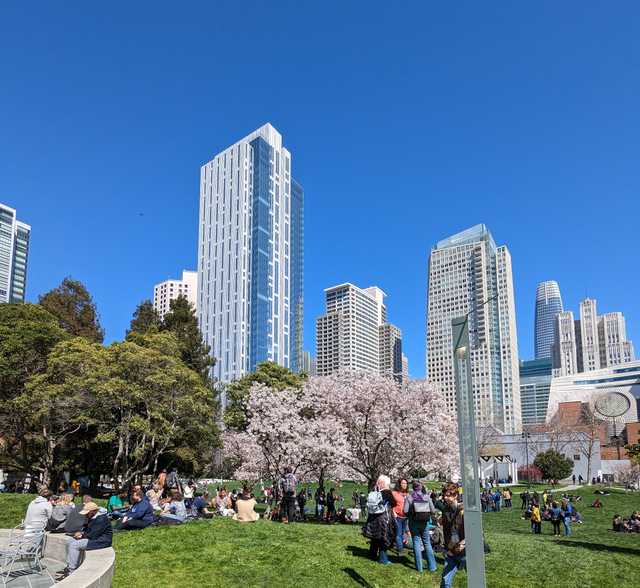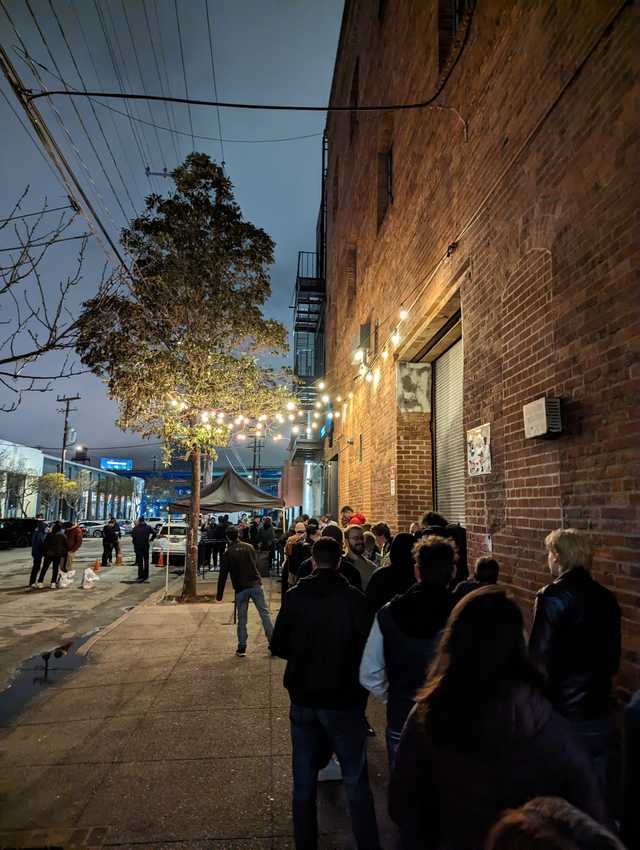
Riad is the product manager of Codecks. He is also the co-founder of indie games company Maschinen-Mensch and still believes that Street Fighter 2 is the most beautiful video game ever created. Coincidentally he also believes that Codecks is the best project management tool for game developers. Apparently he has been creating video games for over 14 years now and considers himself a productivity nerd: scrum, kanban, extreme programming, waterfall, seinfeld. He has tried it all.
Codecks is a project management tool inspired by collectible card games. Sounds interesting? Check out our homepage for more information.
Going to a Game Conference like a Pro (22 tips, you might not know)
Going to a game conference can be as exciting, as it can be daunting and stressful. Whether you’re a seasoned conference veteran or a first-timer, navigating these events can be a rollercoaster of emotions. But hey, no need to fret! As co-founder of Maschinen-Mensch and Codecks.io I’ve been to my fair share of game conferences, and I’ve picked up some common and uncommon tricks along the way. Sit tight, because I’m about to share some proven tips that will help you make the most out of your next games event.
Why go to a games conference?
Before we jump right in, let’s briefly look at why you might want to visit a games conference in the first place. I’m going to share my reasoning why I think some of these reasons are great and why some might be accomplished more efficiently through other means:
- ❌ Playtesting for multiplayer games can work great on show floors. For other games - especially more complex games - there are better ways to gather play test information. You can use a Steam playtest and get online survey data across many players that you can quantify over time, or you can play test across your own friends and game dev peers. You won’t have to worry about people showing up and randomly leaving during their game session, or basically just relaxing at your game because there was a free seat. Also, you can space out the play tests more evenly (for example with your Discord Community) and not do them while you’re stressed and tired from standing by your game the whole day.
- ❌ Marketing: in the grand scheme of things, the small number of people that will be able to play or see your game at a games show is dwarfed by the number of people that you could reach if you would invest the same time into creating tiktok videos or other potentially viral posts. If you go to exhibit a full week at Gamescom (easily 60 hours of time invest of just being on the show floor) you could literally create dozens of short videos in that time and reach 100x the amount of people as on the show floor. That is, unless you’re selling a tool or service to other game devs in a B2B fashion, in that case your target group is so specific that exhibiting in the biz area of a games conference might be worth it for the added reputation and ability to reach exactly the high-value customer that you need to talk to.
- ❌ Watching talks: There are hundreds of free game dev talks on Youtube. There are also dozens of great game dev books sharing insights. There is also this blog. Just in terms of time/money investment, there are cheaper and more convenient ways for absorbing new general knowledge. If you’re watching a talk live you can of course ask follow-up questions, but in my experience reaching out to somebody with a personal email can give you much better info than getting a 10-second response to a live-question.
- ✅ Networking: so why else would you go to a conference, for the people of course! Nothing beats in-person presence to build rapport and a human connection to others. At the end of the day, we never do business with companies, but with people at those companies, and no business deal is done without a level of mutual trust. Using conferences to build those relationships can yield huge returns. Building a network takes time and is hard to quantify, but it can be a life-saver for your company or years in the future. So invest early in your networking, ideally way earlier than you actually need to rely on it.
- ✅ Inspiration: this is a big one. Even if the play testing might not be ideal, even if you could access talks in a more accessible way: if you just enjoy these things, and they excite you and inspire you, that is completely fine and worthwhile. Personally, I get a lot out of just hanging out with my industry friends and re-energizing my batteries, and even if it means just venting to each about some deal or project that fell through. We’re all no machines, so don’t underestimate the power of motivation and getting mental support from people that are doing similar things as you.

What to bring to a game conference
Now that we got that out of the way, here are my top tips after having visited dozens of game conferences (GDC, Gamescom, Reboot, Nordic, Casual Connect, AMAZE and others) throughout the years:
- Comfortable shoes are a must at conferences! Avoid wearing new shoes that you haven’t tried before, as they can lead to painful blisters and discomfort. At a Berlin conference, I had a booth neighbor who ended up in the hospital due to poorly-fitted new shoes that ultimately caused an infection after the third day of the conference. He missed the rest of the conference because he had to go to the hospital! So, always make sure to break in your shoes before the event and ensure you can comfortably navigate the conference floor without any issues. Your feet will thank you!
- Staying hydrated and nourished is crucial during a conference. Be sure to bring water and snacks to the event, as the lines at food and beverage vendors can be long and time-consuming. Nothing is more annoying than spending a valuable hour in a queue just to get an expensive small bottle of water and sandwich. Or worse: walking around like a zombie because you skip hydration and food. By planning ahead and having your supplies ready, you can ensure that you take care of your body’s needs throughout the day. Your energy levels and overall experience will greatly benefit!!
- Cough lozenges can be a lifesaver during conferences! GeloVoice drops from Germany are my personal must-have item, I always pack a couple of them for any event (especially the cherry flavored ones!). The long hours of talking will take a toll on your throat, and having these will help a lot in preventing the dreaded sore throat.
- If you’re traveling to another country, make sure that you have mobile data. Most modern phones support virtual sim cards with data volumes, which you can simply buy via an app and install on your phone in addition to your regular sim card. Not having to rely on dodgy conference wifi to access to your latest emails or to navigate the city can be extremely helpful during a stressful conference day. Personally, I’ve been using Airalo in the past, but there are plenty of options out there.
- Some people like to bring a bag of gifts (e.g. some specialty sweets from your home country or some studio merchandise) that they can give to their most important business contacts. This can be a joyful moment of surprise that will make your meeting remember you fondly.
Before the game conference
- Sign up for a matchmaking service and book your calendar entries a few weeks in advance. A favorite of mine is MeeToMatch. These are usually not being promoted by the event, who might try to push their own matchmaking solution. If you travel to an event, make sure to check if there is an accompanying MeetToMatch opportunity. They also have their own okay-ish mobile app, which you can use to message people if you can’t find them during your appointment. Using a matchmaking service might not guarantee that you get every meeting that you want to have, but if you start reaching out early, you might get meetings with important business partners (e.g. Steam) that would be hard to reach otherwise (especially if you haven’t built a good network yet).
- Try to schedule as many meetings as possible in the same meeting spot. This way, you can reduce travel time between meetings a lot. If you’re using a matchmaking service, keep in mind that the meeting slots are often spread out across half an hour, which means you might have to move around quite a bit within an hour.
- Seek out a party calendar for the event that you’re visiting. Often the event itself will put out an official party calendar, which you can start with. Buy your event tickets early, as often these will be booked out weeks in advance. Personally, I’ve started to avoid parties that are in club locations. These will often draw a huge number of people with loud music and lots of alcohol. Usually, the last place I personally want to be after a long day of networking. I prefer more chill venues like restaurants or bars and events that have a more narrow theme and target audience. For an even better experience, check the next tip:
- Reach out to all your contacts at bigger companies (including your various contacts that have titles like “success manager” or “evangelist”) and ask if their company is hosting something during the event. Often these closed, private events won’t be advertised anywhere, and the smaller crowd will offer a much more pleasant networking experience. You might not have enough “standing” to be automatically invited, or people might just not be aware that you are traveling the event, so proactively asking can go a long way to finding those nicer events.
- Update your X profile or other social media profile name to include the event name to telegraph that you’ll be at the event soon. On X people often switch their username to “[Username] 🔜 [Conference Name]”, which can help make your attendance more visible. Additionally, post that you’ll be going to the event. Make sure to use an image in your post since these will give it more visibility.
- Familiarize yourself with the floor plan in advance and make sure you have an idea for how to get to your meeting points. I’ve lost plenty of time in the middle of the conference floor with shoddy internet connection, having no idea how to reach the next meeting point.
- Plan in enough time between meetings, but also enough slack time in general. Some of my best and most gratifying connections happened coincidentally. Meeting new people through shared contacts in an organic way is great for building new relationships, since your new contact, and you, will have been “vetted” by your shared contact. Therefore, these relationships can already start with more established trust level. Also, people will usually be more relaxed if you meet them outside a narrow scheduled meeting and feel less transactional. If you don’t leave any wiggle room in your calendar, you’ll prevent yourself from having these experiences. A lot of GDC visitors go even as far as not buying any ticket for the conference itself and hanging out in the Yerba Buena Gardens randomly bumping into old and new acquaintances this way.
- Know your pitch in your sleep. Practice speaking it out loudly (even if it feels stupid) and make sure that you can make it flow well in 10 minutes. It’s likely that you have to move between meetings (see tip 2) or that your meeting partner will have to travel, or that one of you might have to leave early to get to the next destination. Even if you make sure to leave enough buffer time after your bigger pitch meetings, chances are high that your meeting partner didn’t, so make sure that you can make an impression in a short time. If you manage to get the attention of your meeting partner, you will have plenty of follow-up discussions anyway, so focus on nailing the most important aspects of your pitch and leave some time to build rapport instead of losing your meeting partner’s attention in an overwhelming sea of details. (How to pitch to publishers.)
- Business cards are a bit outdated, but make sure you have something to stay in touch. Install an app with QR code and put it as a widget on your screen.

During the game conference
- Don’t get overwhelmed. Don’t put yourself in a frenzy that every second counts. If you do that, the meetings will start blurring into another, and you won’t be able to build real connections, which should be your main priority. Don’t succumb to FOMO (even if it is hard). It will be impossible to go to every party and every event and meet everybody, so don’t stress too much and try to enjoy the experience. It is totally fine to cancel meetings in advance and be transparent about you not feeling great. Just make sure to not just show up to meetings, since that is highly disrespectful.
- Record a quick audio snippet after every conversation. I recommend the Google audio recorder. It also transcribes each recording, making it easier for you to search and process the recordings afterward. If you’re extra fancy, you can even export the transcription to an AI that automatically summarizes the meeting notes and action points. I don’t know anybody else that does this, but for me this technique has been a superpower.
- Perfecting your pitch is an art. Use a basic frame to guide through your pitch, but don’t miss the opportunity to also vary your pitch when you see your partner’s eyes light up. It’s good to have different avenues into which to develop your live pitch. Testing variations of your pitch can help you a lot. Mix it up and challenge yourself by trying small adjustments to your pitch in every conversation. You might discover that a specific way of phrasing your pitch captures the imagination of your audience much better.
- Building a network takes time. See it as a ladder that you will climb over time. Sometimes you hit it off great and may escalate a couple of steps right away, often when meeting new people for the first time it is just fine to step on the first step and leave it at that.
- Don’t engage with toxic people. This might seem obvious, but often people will put up with toxic behavior because their contact might be in a particular powerful position. Don’t put up with this. It is not acceptable that anybody puts you down and if you feel like people are draining your energy, just move on, there are plenty of great people out there for you to rather spend time with. As general advice, don’t be too obsessed with having to build connections with people that are further ahead in their career. Networking with peers can feel much more organic as you will likely have the same struggles and aspirations and as your career develops further, so will the career of your peers and become powerful contacts throughput the years.
- Find your own way. Some would say that parties are where the real business deals are made, but only do go to parties so if you actually enjoy it and not because you feel pressured into it. We’re all different, and you will have to find your own style of connecting to people. If you’re a party animal and that works best for you, knock yourself out, but if you’re more of an introvert that is completely fine too and plenty of people are looking to engage with you in more relaxed environments and in your style.

After the game conference
- Effective follow-ups are as important as attending the conference in the first place. Go through your audio notes (see tip 2 above). Write people a quick email or connect via LinkedIn. Don’t wait too long for this, because even though you might have perfect notes, your partner might have not and literally forget about you. If you want to be really serious about building your network you can also use a CRM (Customer Relationship Management) platform to have all your notes about a contact in one place together with your related emails and messages. Personally, I use Pipedrive for this.
- Reflect what went well and what made you feel stressed and write it down, so you have your notes to check again before the next conference you visit. This way you’ll build a set of rules that will make that you get the most out of each conference.
These are all my personal rules and notes that I’ve developed over the years. I’m curious about hearing yours! Let me know at riad@codecks.io